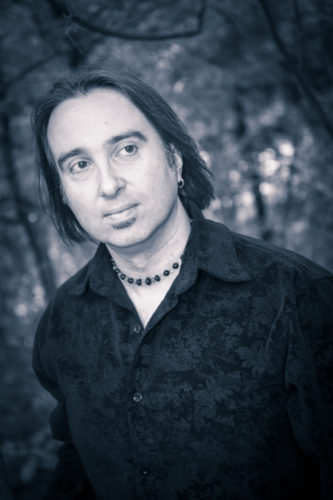[The Wild Hunt is pleased to welcome Tim Titus to our monthly team. Titus’ column will appear on the first Saturday of every month, beginning in August. He will be sharing his own perspective on life, community and religion. Check out his full bio for more on his work and interests.]
The notions of freedom and personal spiritual authority are driving factors that bring people into the practice of a Pagan religion. Many modern Pagan practitioners are fleeing the older, more dogmatic and hierarchical forms of religion offered by the mainstream in favor of seeking a spiritual practice that speaks to them and is controlled by them.

Sacred Harvest Festival Brush Oak Grove
In Drawing Down the Moon, Margot Adler specifically cites “freedom” as one of the major attractions that a Pagan path holds for modern people, writing that people often become Pagan “because they could be themselves and act as they choose, without what they felt were the medieval notions of sin and guilt” as well as a refusal to honor “rigid hierarchies and institutionalization” (23). In Paganism: An introduction to Earth-centered spirituality, authors Joyce and River Higginbotham specifically list “A pronounced religious individualism” (4) as a major tenet of their Pagan religion. Pagans, it would seem, seek their own paths rather than membership in any leader’s flock.
Yet leadership is still necessary, even for such an individualistic group of people. Although Pagans may not follow a shepherd’s crook as their ultimate beacon of hope nor any one sacred text as an infallible set of rules, we still look to those who have blazed trails to help us down the path that best suits our needs. If everyone hacked their own way through the woods, all the trees would be dead and the underbrush trampled.
![[Courtesy Photo]](https://wildhunt.org/wp-content/uploads/2016/06/John_Beckett_Pic.jpg)
John Beckett [Courtesy Photo]
Beyond that traditional leadership role, Beckett also sees Pagan leaders as teachers, managers, and visionaries. In the role of teacher, he emphasizes the necessity of strong communication skills. And, the role of manager is necessary because, while any group has a set of goals that drive it, “someone has to make sure all this gets done.” In the visionary role, leaders are needed to “articulate a vision and inspire people to do what’s necessary to make it a reality.”
Without leaders, our vision of the future can be difficult to see and even more difficult to attain. It is vital to the health of Pagan communities to produce strong, ethical people who are willing and able to perform these leadership functions.

Shauna Aura Knight [Courtesy Photo]
Christopher Penczak, author and co-founder of the Temple of Witchcraft, says that this is how he became involved in leadership. “Each time I got the call to take on a little more responsibility,” he writes, “I thought that would be as far as it would go. Yet every few years, the call to go deeper would happen.” Although he did not seek a leadership role, “each time there was a need, and I found myself asked to step into a new and uncomfortable role.”
David Salisbury, an author and co-facilitator of The Firefly House in Washington, D.C. echoes this process, saying that, “I like to think that I tripped, stumbled, and fell into leadership.”

Christopher Penczak [Courtesy Photo]
Penczak states that communication skills are indispensable. “While you can’t please everyone all the time, and really can’t even try,” he says, “you have to understand what people are saying to you and be able to convey what you can and cannot do, and why.” Alix Wright, the Lead Pisces Minister in the Temple of Witchcraft, agrees, noting that, “You can’t expect people to do what needs to be done, if you can’t tell them in a manner that they understand.” Wright adds that, “Since everybody hears and understands in different ways, you have to be able to communicate in a style and manner that matches each person you’re working with.”
Knight also recommends “the ability to hold paradox.” She writes, “Some issues are not just the binary of black and white, good or bad,” and explains that, “many leaders get stuck in being a know-it-all obsessed with being right, and that causes a lot of conflicts.” Salisbury echoes this when he advises young leaders to “remain humble and open to listening to your community.”

David Salisbury [Courtesy Photo]
Wright and Salisbury agree that doing too much at once is a major obstacle for new leaders. Wright emphasizes that, “One of the lessons I needed to learn was that it’s okay to say no, and when I do say yes, then it’s okay to ask for help and delegate.” Salisbury cautions against “trying to be everything to everyone all at once” because “burnout is a major leader-killer.”
Knight fears that, when new groups or events begin to form, those in charge “never stop to talk about what their goals are,” and she warns that, “most conflicts come from assumptions.” She advises “direct communication” to unravel those conflicts.
She also warns against another pitfall of leadership: “egotism.” “Many leaders desperately want to be ‘the person with the good idea,’ or ‘the one who’s right’ or, more broadly, ‘the savior.’ ” This, she says, leads to poor boundaries and poor choices, and it brings her back to stating her top quality for leadership: self-reflection.
“Know thyself.”
Perhaps this ancient wisdom is the single best piece of advice. As John Beckett stresses, in the end “leaders are servants.” Leaders serve those whom they lead, providing them with spiritual experiences and practical direction, sometimes at their own expense. “Good leaders do that work,” concludes Beckett, “because they want to serve the Gods, their groups, the Pagan community, and the world at large.”
The Wild Hunt is not responsible for links to external content.
To join a conversation on this post:
Visit our The Wild Hunt subreddit! Point your favorite browser to https://www.reddit.com/r/The_Wild_Hunt_News/, then click “JOIN”. Make sure to click the bell, too, to be notified of new articles posted to our subreddit.
❝Here’s a hard-won lesson that I will pass along free of charge. Real leadership is earned in blood, sweat, and tears. The title comes later after you’ve proven you deserve it six or seven times. Leadership comes from building others up so they are strong enough and get stronger. Effective leadership comes from making the team flexible so the job still gets done no matter what happens along the way. Inspirational leadership means they volunteer for dirty parts so the job is done and done right. And amazing leadership comes from them doing all this and more without you telling them what to do.❞
– On Pagan Leadership
It’s odd to me why so many in the pagan community don’t look to good management models that have served well in the corporate world or in the military. In those cases, you are faced with similar problems: motivating people, developing people and supporting people.
I’m a huge fan of Simon Sinek, and his work has influenced my own leadership in my career and in my work with my faith community.
A professor of mine one told me “Don’t reinvent the wheel”. If the groundwork is out there, use it but give credit.
Not so odd when you realize how many people have experienced the toxic versions of the corporate or military models, also presented with slick PR, and want nothing to do with it or anything resembling it. When some of those people discover they are Pagan, they don’t get an automatic workshop in management appreciation. Their responses are pretty much the same.
I would agree, with one partial exception. I think we do need a greater degree of professionalism or at least technical competence when it comes to building and sustaining our institutions. I’m not a huge fan of institutional religion nor hierarchies, but we are slowly finding our way toward acceptance of institutions where they serve some needs which are authentic to who we are as a movement. In those instances, it really pays to have people who know their stuff with accounting, budgeting, non-profit fundraising and management etc. The old “build it and they will come” community center/temple has failed pretty much 100% of the time and I think we’re coming to realize that.
I think we can draw on the idea of “effectiveness” from corporate or military models (or any other source). The difference lies in what are we seeing to do with effective leadership. In the corporate world, it’s really all about exploiting people as a resource, usually to the point of depletion. I think what we should strive for is to have leadership which is effective at building and maintaining systems which are resources for people rather than the other way around and resources which are sustainable in every sense of the word.
I don’t have any disagreement with your remarks here. Just pointing out that, like conventional religion itself, conventional leadership models have left a bad taste for some.
I think that the technology is sound, even if one doesn’t like the fact that some have used it badly or for nefarious purposes in the past. The idea that the techniques of management are somehow “tainted” is quite frankly an immature way of looking at it.
And I think that refusal to look outside the Pagan orbit for good strategies is costing us a lot. No doubt the knowledge leaders have gained came at a price – broken covens, hurt feelings, etc. If leadership could be given tools that work, regardless of source, we should adopt them.
Maybe by catering to that closed community mindset by labeling “Pagan-“, we avoid good solutions. There aren’t Pagan-ethics, there are just ethics; there isn’t Pagan-networking, there’s just networking. What we need are good tools we can bring into the community. The resistance means we spend a lot of time reinventing wheels.
It’s not immature as much as emotional, found in adults as well as children. As such, it isn’t countered effectively by logic, let alone by pejorative labels.I quite agree that Pagans should look outside as well as inside the Pagan community for good solutions. We adopt spiritual tools from all over; why not management tools?